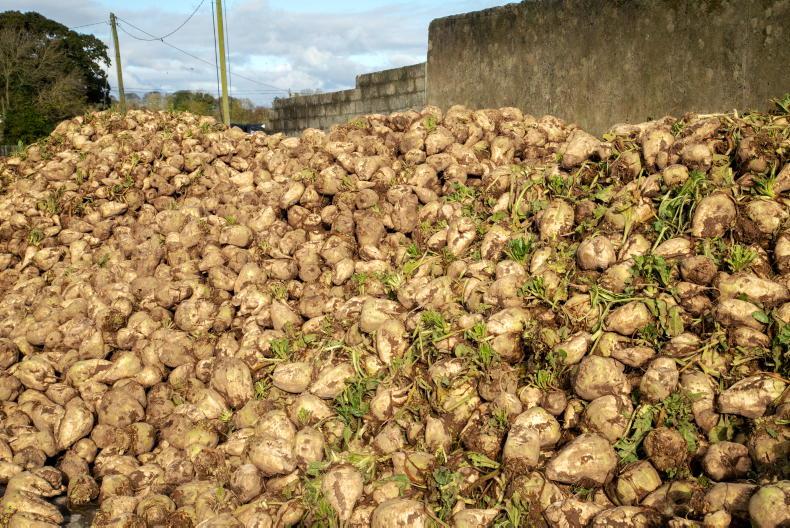While feeding beet may sound foreign to many beef farmers, for finishers with sufficient scale or those in the east and southeast, a finishing diet is rarely complete without the inclusion of beet.
Fodder beet is a highly palatable, highly digestible feed and an excellent source of energy (60% to 65% sugar), making it an almost perfect finishing diet ingredient. On an energy basis, 5kg fresh weight of beet is equal to 1kg of rolled barley. However, the added benefit of beet is that its high palatability drives intakes in cattle which will help maximise liveweight gains.
Beet is like the box of chocolates in front of you when you have just had a big dinner – but you just have to have “one more”.
Feeding rate
It is recommended that fodder beet makes up no more than one-third of the finishing diet on a dry matter (DM) basis. Feeding higher levels can cause stomach upsets, scour and acidosis in severe cases.
As a rough rule of thumb, you can feed 3kg to 4kg of beet per 100kg animal liveweight.
It is for this reason that a slow and steady transition to high feeding levels is required for finishing animals. Start cattle on 3kg to 5kg of beet and increase it by 3kg to 5kg every five days.
It is important that cattle have sufficient access (600mm head space per finishing animal) to the feed during the buildup phase to ensure that all animals are eating their full allowance prior to the feed rate being increased.
Feed management must be excellent when feeding beet
Once you are feeding over 12kg to 14kg of beet/day, it is important to split feeds into morning and evening to avoid rumen upsets.
Feeding at total mixed ration (TMR) when feeding beet can be advantageous from this point of view. For finishing bullocks you are typically looking at feeding 25kg beet/day.
Feed management must be excellent when feeding beet.
Animals should never run out of beet or concentrate balancer. Always have a source of long fibre available such as silage or straw and fresh water must be available.
Balanced diet
Beet is low in fibre so a fibre source such as grass silage or straw is required when feeding high levels.
Beet is also low in crude protein ranging from 6% to 8% depending on the variety. Therefore, some sort of protein balancer must be included in the ration.
For finishing diets where grass silage is being fed as the forage source, you need to balance the concentrate input to a 12% crude protein.
Therefore, feeding 25kg of beet alongside either 2.2kg of a 20% protein balancer or 1kg of rapeseed meal (35% crude protein) or 0.8kg of soya bean meal (45% crude protein) will be sufficient.
As for all finishing diets, mineral supplementation is required.
Beet is low in minerals, especially phosphorus, so you should use a mineral mix designed specifically for beet feeding.
Washing
Depending on the variety and the conditions around harvest, beet can contain 10% to 15% soil tare. It is important that this soil is removed from the beet prior to feeding to cattle. While mechanical cleaning may be enough for low levels, or a short period of feeding, washing is a must for high levels of beet feeding.
Where animals have a high intake of soil, it can cause minerals to become locked up, particularly in the case of copper. There is also a greater risk of clostridial diseases with beet that is unwashed.
Storage
While many farmers will be working with loads being delivered as required, there is still some storage requirements to consider with beet. Keep clamps long and narrow so that you are moving back the clamp every few days. Where beet will be sitting in the yard for a prolonged period, it is worth covering it with a deep layer of straw to protect from frost. Frosted beet can cause digestive upsets and feeding such beet should be avoided.
Chopping beet is advisable where high DM varieties are being used. This is due to some varieties being too hard for cattle to feed whole which will have a negative effect on intake.
Cost
Depending on location, beet is currently trading from €40/t washed excluding delivery up to €50/t to €55/t washed and delivered. In other areas, unwashed beet is moving from €40/t to €50/t mark delivered. Obviously, some bigger customers are managing to do deals at slightly better rates than this. With rolled barley currently at €205/t to €215/t, if you can secure washed beet at the lower range of the prices outlined above, it does offer value for money on a feed value basis. As stated earlier, beet can also be worth that bit more in finishing diets due to it giving you an extra 0.5kg DM daily intake over and above what cattle would do on an all-dry concentrate diet.






 This is a subscriber-only article
This is a subscriber-only article









SHARING OPTIONS: